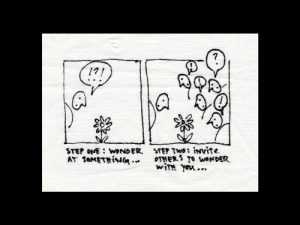Shawna Reibling, RIR – Guelph
Shawna Reibling, Knowledge Mobilization Coordinator at the Institute for Community Engaged Scholarship (ICES) at the University of Guelph, describes her journey to becoming a knowledge mobilizer.
Shawna Reibling, Coordonnatrice de la mobilisation des connaissances à l’Institute for Community Engaged Scholarship (ICES) de l’Université de Guelph, décrit le cheminement qui l’a menée à devenir mobilisatrice de connaissances.
 I discovered to the field of knowledge mobilization by way of biology. In my Grade 11 year of high school I was a naturalist assistant in Neys Provincial Park. In this position I discovered that sharing hands-on knowledge about lichen, garter snakes and lamprey, was something that park visitors could appreciate. The ability to share the information about the wonders of the park, to transfer knowledge, was my passion. Recently, when I was writing a clear language summary of Dr. Hanner’s work entitled “Genetic calibration of species diversity among North America’s freshwater fishes”, he mentioned lamprey and I was immediately engaged – there is still so much to learn about fresh water ecosystems. This is one of the drivers of a knowledge mobilizer – the desire to spread information and allow people to wonder with you. Engaging knowledge translation and exchange may lead to co-creation of knowledge. Did some of those kids who held the garter snake go on to be biologists, working with park rangers?
I discovered to the field of knowledge mobilization by way of biology. In my Grade 11 year of high school I was a naturalist assistant in Neys Provincial Park. In this position I discovered that sharing hands-on knowledge about lichen, garter snakes and lamprey, was something that park visitors could appreciate. The ability to share the information about the wonders of the park, to transfer knowledge, was my passion. Recently, when I was writing a clear language summary of Dr. Hanner’s work entitled “Genetic calibration of species diversity among North America’s freshwater fishes”, he mentioned lamprey and I was immediately engaged – there is still so much to learn about fresh water ecosystems. This is one of the drivers of a knowledge mobilizer – the desire to spread information and allow people to wonder with you. Engaging knowledge translation and exchange may lead to co-creation of knowledge. Did some of those kids who held the garter snake go on to be biologists, working with park rangers?

I rediscovered knowledge mobilization in graduate school. My work at the School of Communication at Simon Fraser University focused on technology policy and analysis. I was assigned was to write a mock SSHRC grant to fund my thesis proposal and convince a Committee that my thesis was fundable. The classic “So what? For whom?” questions of knowledge mobilization were made clear to me in my first steps as a researcher. I believe that it is never too early to embed knowledge mobilization in education!
 In my work at University of Guelph, I continue to ask “So what? and “For whom?” in my work making websites to communicate knowledge. Posting event summaries, products, experiences on the internet, takes advantage of the long-tail of the internet to ensure that knowledge makes an impact over time. Therefore many of our event products are posted online. If you miss a Social Media Learning Circle event, you can access the powerpoint online to review and share. Recently I’ve passed 1000 views of my powerpoints on SlideShare, a web hosting service for online documents.
In my work at University of Guelph, I continue to ask “So what? and “For whom?” in my work making websites to communicate knowledge. Posting event summaries, products, experiences on the internet, takes advantage of the long-tail of the internet to ensure that knowledge makes an impact over time. Therefore many of our event products are posted online. If you miss a Social Media Learning Circle event, you can access the powerpoint online to review and share. Recently I’ve passed 1000 views of my powerpoints on SlideShare, a web hosting service for online documents.
An example at Univeristy of Guelph is the ‘Living healthy, well and strong in our neighbourhoods’ project. The photos and findings were exhibited in the community, but now it is always available online. It has been an influence on the Guelph Community Wellbeing Initiative (GCI).
 These are examples of the importance of sharing knowledge products – so people can find and access discoveries. Knowledge mobilization is sharing.
These are examples of the importance of sharing knowledge products – so people can find and access discoveries. Knowledge mobilization is sharing.
Today I am still involved in mobilizing knowledge. I am always inviting people to wonder with me. Through Twitter as @ICESGuelph and @MobilizeShawna, I work to mobilize knowledge at the University of Guelph and as part of ResearchImpact.
Find out more what I do at the University of Guelph.